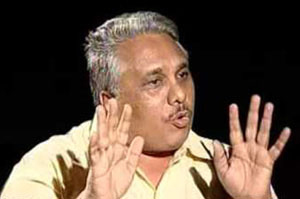Mysuru, Feb 26: MLC Go Madhusudan has urged Chief Minister Siddaramaiah to table the report of the Karnataka State Minorities Commission on Wakf properties, headed by Anwar Manipadi, in the coming legislature session so as to protect properties that rightfully belong to the minorities. The report was submitted on March 26, 2012.
Addressing mediapersons here on Thursday, the MLC said, politicians from the minority community, belonging to all parties, had usurped around 57,000 acres of Wakf land in the State and politicians from other communities too like Congress leader in Lok Sabha Mallikarjuna Kharge and former chief minister Dharam Singh own a few of these properties.
“The government value of the said 57,000 acres of land is estimated at Rs 2.5 lakh crore and its market value would be around Rs 15 lakh crore. If the money, looted by the so called leaders of the minority community, is distributed among the minority people (considering their population in the State to be around one crore), each person will get Rs 15 lakh,” he said.
Noting that the Wakf properties had become like ATMs (anytime money) for minority community leaders, Madhusudan said that the vested interests in the minority community were not allowing the tabling of the report.
“The High Court had directed the State government to table the report, based on the petition filed by former minister S K Kantha. During the last session, in November last, as the government did not abide by the ruling of the Speaker to table the report on the basis of the privilege motion moved by legislators A H Shivayogi Swamy, Ganesh Karnik and K Monappa Bhandary, I had staged a dharna in the Council. The vested interests are trying to prevent the report from being tabled for the fear of being exposed,” Madhusudan said.
The MLC, whose term ends on July 4, has written to the chief minister in this regard, recalling that he had written a similar letter on October 27, 2015.






Comments
GO Madhusoodan GO......West is fuelling RSS to Divide and destroy INDIA
Add new comment